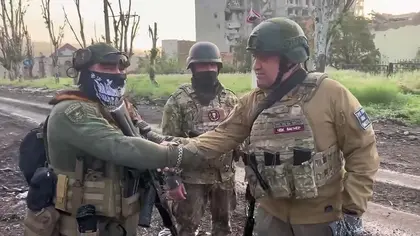While much confusion and uncertainty still prevailed, on Saturday morning, June 24, Russia appeared to be experiencing an attempted military coup d’état led by the chief of the Wagner mercenary forces, Prigozin.
He has declared war on the central military authorities and his force is aiming to deploy to the southern Russian city of Rostov-on-Don and make that his stronghold.
JOIN US ON TELEGRAM
Follow our coverage of the war on the @Kyivpost_official.
Overnight a state of martial law has in effect been declared in Russia as can be seen from the reinforcement of security in Rostov and elsewhere, including and Moscow itself.
Here’s the background.
Russia’s FSB security service on Friday, June 23, accused Yevgeny Prigozhin, the head of the Wagner mercenary force, of attempting to launch a “civil conflict.”
Spetsnaz elements of the Rosgvardiya (National Guard), considered President Vladimir Putin’s praetorian guard, have surrounded Wagner headquarters in St. Petersburg, according to unconfirmed social media posts.
In Moscow, Igor Krasnov, Prosecutor General of the Russian Federation, reported to Putin in the early hours of Saturday regarding “the context of initiating a criminal case in connection with an attempt to organize an armed rebellion,” Russian state news service RIA Novosti reported.
Meanwhile, army vehicles have been spotted in the center of Moscow, near the Cathedral of Christ the Savior.

Moldova PM Says Russia Troops Must Leave Transnistria to Solve Crisis
Meanwhile in Russia:#Prigozhin #Wagner pic.twitter.com/cttyBASkay
— Julia Davis (@JuliaDavisNews) June 23, 2023
The FSB has urged Wagner’s fighters to detain Prigozhin. Security measures have been tightened in Moscow and Rostov-on-Don, a Russian city near Ukraine’s Donbas region.
Does this mean Russia has descended into civil war?
Not yet. But chaos is gathering around the Wagner chief, and there have already been unconfirmed reports of skirmishes between Wagner and Russian Federation (RF) troops, as well as an RF helicopter shot down by Wagner in the Rostov region.
Earlier on Friday Prigozhin accused the RF Army of shelling one of his Wagner camps and called for retribution. “I’m asking, no one resist. Everyone who will try to resist, we will consider them a danger and destroy them immediately, including any check points on our way, any aviation we see above our heads.”
Prigozhin called on everyone to remain calm and vowed “justice.”
In his accusation, however, he specifically mentioned that “presidential authority, government, interior ministry, Rosgvardiya and other departments will continue operating as before." In other words, deducing by process of elimination: Prigozhin’s enemy is the Defense Ministry run by Sergei Shoigu, defense minister, and Valery Gerasimov, chief of the general staff, both of whom he has been criticizing harshly for months.
Who actually shelled the Wagner camp has yet to be independently verified. Some Russian milbloggers have noted an uptick in Ukrainian shelling around the city of Donetsk, but that could also be disinformation meant to give the Russian army plausible deniability.
By early Saturday morning, Prigozhin made a video statement from Rostov's military headquarters. He said that he had taken control of all military objects, including the airfield, and that Gerasimov "ran away as soon as he found out we were approaching."
So, at this stage the Wagner chief is calling for a rebellion specifically against Russia’s Ministry of Defense.
But until Wagner starts shooting (or shooting back) in earnest at the Russian regular army, Prigozhin’s action are merely sedition – i.e., still below the threshold of civil war.
Does Prigozhin have any support in this power struggle?
The Wagner group has long had supporters in high places. Prigozhin was Putin’s personal chef, and the mercenary group has been helping the Kremlin prop up and control the self-recognized republics of Donetsk and Luhansk since 2014, when the group was founded.
In May, former Russian intelligence officer Igor Girkin claimed that Prigozhin was a “project” of several members of Putin’s inner circle. Girkin has been a harsh critic of all the top brass in Russia’s war against Ukraine since the full-scale invasion in February 2022.
“There are very serious forces behind Prigozhin. According to some of my informants, [Sergey] Kiriyenko, is directly behind him,” Girkin said.
Kiriyenko, Vladimir Putin’s Deputy Chief of Staff, oversees the occupied Ukrainian lands and controls the entire process of formation of Russia’s modern “elite,” according a ZN,UA news analysis. Kiriyenko’s influence has grown since the full-scale invasion began, and now he is an independent figure.
“Kiriyenko is backed by the Kovalchuk brothers, people who are part of the President’s inner circle,” Girkin added, referring to Yury and Mikhail Kovalchuk, both of whom are considered Putin’s “personal bankers.” Yury Kovalchuk is the chairman and the largest shareholder of Rossiya Bank.
However, even if Girkin’s analysis were true, Prigozhin may have overstepped his bounds past the point of no return.
How does this effect Ukraine’s ongoing offensive?
It appears from early reports that the Armed Forces of Ukraine (AFU) is ramping up the pressure on the various front lines. Whether that’s due to the news coming from Russia is unclear, but it’s safe to say anything that might muck up the gears of Russia’s command structure would be welcomed by the AFU. And it’s exactly this type of situation that AFU Commander-in-Chief Gen. Valery Zaluzhny has been looking to exploit.
So, what will become of Russia if Wagner heads toward Moscow?
Regarding Russia, Winston Churchill has been famously quoted: “Kremlin political intrigues are comparable to a bulldog fight under a rug. An outsider only hears the growling, and when he sees the bones fly out from beneath it is obvious who won.”
At this stage there’s lots of growling and barking. But despite the minute-by-minute posts on social media, the bones are still under the rug.
You can also highlight the text and press Ctrl + Enter










